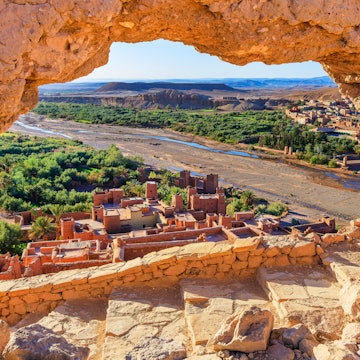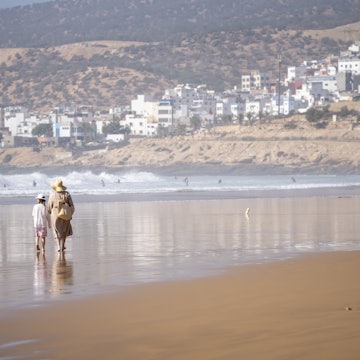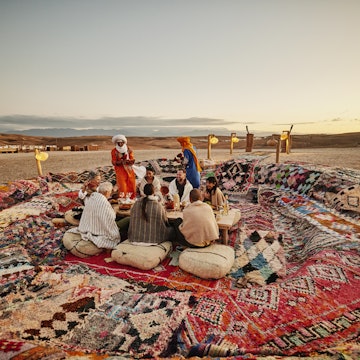

North Africa, Morocco, Marrakech. Henna Hands.
Marrakesh is no stranger to tourists, and travellers flock to the rose-hued city to discover the medina, scour the souqs for treasures, admire traditional zellige (colourful geometric tiles) on ancient mosques and savour local flavours at the food stalls of Djemaa El Fna. With the threat of overtourism encroaching on the red city, it’s imperative that travellers leave a minimal footprint as they wander Marrakesh’s labyrinth.
Travelling responsibly means being aware of the environmental, social and cultural impacts of your visit. Travellers can counteract mass tourism by making mindful decisions about where they stay, shop, eat and explore, through respecting cultural norms, avoiding experiences that exploit people or animals, reducing waste and supporting local businesses. Here’s how you can do your part to travel responsibly in Marrakesh.

Henna Cafe
Expand your palette with the exquisite flavour of a Berber-style lunch of lentil salad, cured lamb and couscous at the intimate open-air rooftop terrace of the Henna Cafe. While you feast, the chaotic clatter of the bustling medina streets and the afternoon call to prayer blend with the chipper chatter of local women who adorn diners' hands and ankles with all-natural red henna designs. All proceeds benefit Henna Cafe’s cultural foundation, which offers free education to residents of Marrakesh.
Jarjeer Equine Refuge
Animal lovers might be shocked at what they see at the always busy Djemaa El Fna, Marrakesh's popular central square. Innocent travellers who stop to admire crafts, listen to live music or get a fresh-squeezed orange juice are often suddenly startled when an animal handler tosses a leashed Barbary macaque monkey into their arms or wraps a snake around their shoulders. Many of these animals suffer from maltreatment and some have their teeth removed. Instead, for an ethical animal encounter visit the Jarjeer farm, a charitable sanctuary that's a retirement home for more than 50 elderly, abused, disabled or mistreated donkeys and mules. Travellers are invited to visit the refuge’s equine stables and paddocks, where they’ll hear the stories of the furry inhabitants’ lives from the Berber muleteers who fight for animal welfare in Morocco. You’ll meet Tommy the donkey, a SPANA rescue, who is the self-declared leader of the pack and pens the Jarjeer blog. Jarjeer is free to visit, though donations are appreciated. The farm is located in the foothills of the Atlas Mountains in Douar Oumnas, at 24 km on Route d’Amizmiz.

Ensemble Artisanal
Pick up fair-trade souvenirs at the government-sponsored craft market, Ensemble Artisanal. In a classic blush tadelakt (waterproof plaster) building, henna masters weave past shoppers and ancient zellige tiled fountains while artisans teach their young apprentices the time-honoured trade of Moroccan handicrafts. An abundance of unique mementos can be made-to-order as you mingle with members of female cooperatives who hand-make Berber rugs on antique looms, shoemakers who craft camel leather babouche slippers with an array of vibrant colours, patterns, and ornaments, as well as craftswomen who will embroider your favourite phrase onto a straw bag or sun hat. Shopping at Ensemble Artisanal is haggle free as the prices are fixed and fair. Morocco has banned plastic bags, so be sure to bring your own reusable tote.
Dar Justo
Immerse yourself in Moroccan heritage in the heart of the medina by staying at the traditional 14th-century home turned eco-friendly hotel, Dar Justo. Here, purified wastewater is repurposed to nurture plants and supply toilet tanks, and solar panels supply the energy. Dar Justo is committed to social sustainability, and they employ locals, pay competitive wages and provide staff with support for continued education and hospitality training. The rooms are embellished with locally hand-carved wood panels, and when you're done soaking up the spectacle, you can relish in ritual treatments at the in-house hammam, Le Bain Bleu.

Amal Center and Cafe
Add a dash of exotic herbs and spices and brush up your cooking skills at the not-for-profit Amal Center, where travellers can learn customary cooking methods for preparing tajine, couscous or pastilla (savoury-sweet stuffed pastry). Amal, meaning ‘hope’ in Arabic, helps disadvantaged women from nearby villages to attend the nonprofit’s free culinary education course so that they can become financially independent. There's a branch in the neighbourhood of Targa, but the original is in Gueliz, just a few blocks away from Jardin Majorelle and boasts a beautiful outdoor cafe, which serves home-cooked meals prepared with love by the trainees.
Le Palais Paysan
Nestled at the intersection of sustainability and luxury is the regal Le Palais Paysan, just outside the chaotic city. Staff hail from neighbouring villages and receive hospitality education. The on-site organic orchard grows fruits, herbs and olives as hens wander freely around the garden. Other produce is sourced from local farmers, and homemade baladi bread is delivered each morning from the village. Solar panels and a local well provide ecological sources of energy and water. Take it all in with a lap in the pool or by trying your hand at Arabic calligraphy in a class led by a local teacher. The eco-resort is located in a serene oasis with spectacular views of the Atlas Mountains at Km 20 on Route d'Amizmiz.

Cafe Clock
The phenomenal Cafe Clock is located in a classic riad that’s been modernised with crisp white walls offset by colourful decor and cosy seating areas throughout the building and the rooftop terrace. The menu offers Moroccan fare with options that will satisfy vegans, vegetarians, gluten-free eaters and those brave enough to try a camel burger. Food, music and art converge to celebrate Moroccan heritage and keep traditions alive through cultural community events. Houariyat women of southern Morocco sing energetic poems of love to the rhythm of Berber drums. Gnaoua musical troops honour their ancestors by performing the hymns their enslaved forefathers sang as they crossed northern Africa in shackles to lift their spirits and invoke baraka, a sacred spiritual trance obtained through music and dance. Groups of storytellers gather to share the thousand-year-old oral tradition of reenacting Arabic folk tales. Visitors may also learn to play the oud (a Middle Eastern wood string instrument) from a local shop owner, Mohammed Semlali.

Free walking tour with GuruWalk
For an authentic glimpse into local life, explore the narrow alleys of the medina on a female-led tour with Basma from GuruWalk. Basma was born and bred in Marrakesh and is an expert at navigating its mazes. Her tours focus on history, ecotourism and culture with stops at cooperatives, lesser-known attractions and Moroccan street food vendors, and her custom itineraries can cover photography, art, music, history or culture. Though the four-hour walking tour is free, tips are appreciated. The meeting point is near Koutoubia Mosque.
http://shop.lonelyplanet.com/morocco/pocket-marrakesh-4/
















